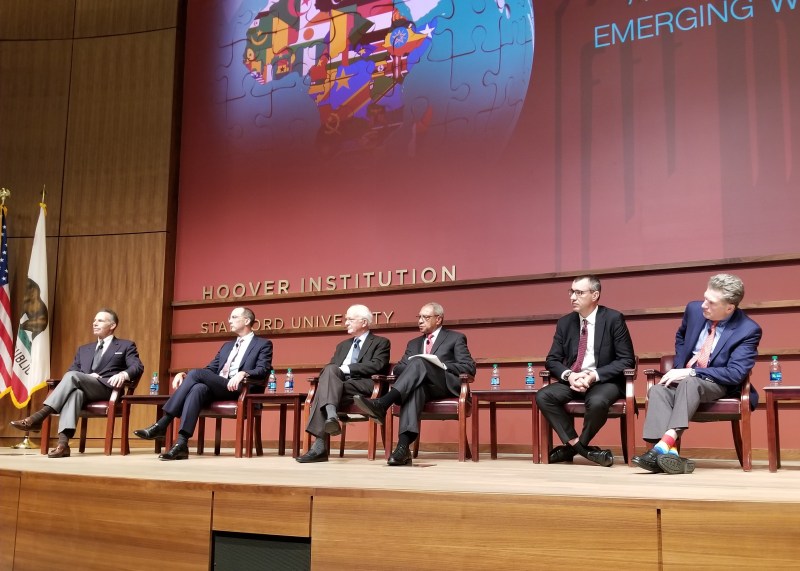“Just as we used to tell people, ‘Go west — that’s where things are opening up, growing, dynamic,’” said Jack Goldstone, public policy professor at George Mason University, “I will say to people, ‘Go South,’ because for the next fifty years, Africa is going to have… critical impact on the growth of the [global] economy.”
To address this economic opportunity and the challenges to governance arising from it, five Africa experts gathered at the Hoover Institution’s Hauck Auditorium for a “Governance in an Emerging New World” panel on Africa’s development.
As one of the world’s fastest-growing economies, Africa has the potential to capitalize on its young labor force and the benefits of the technological revolution. But, according to Goldstone, the continent’s economic progress could be complicated by political instability, conflict and unplanned migration.
The growing young population presents the first challenge.
“By 2050, Africa will have more people of working age than China, India and the United States combined.” Goldstone said. “The question is [if] Africa can function like China, and go from a relatively low-income and rural place to an industrial and fast-growing economy.”
According to Goldstone, a “great opportunity” could be realized if the younger generations are able to grow up in a world where they can get the education and capital to contribute to the global economy.
“If Africa’s economy does not grow in a way that provides jobs and meaningful future for its young people,” Goldstone said, “then we may see … young people drawn to more radical ideologies and growing risk of political instability and violence.”
Conflicts can subsequently produce divisive and autocratic leaders, according to Chester Crocker, Georgetown University professor and former assistant secretary of state for African affairs.
“Conflicts tend to produce the kind of leaders who think primarily about themselves or their [own] ethnic group, and not enough about the interests of broader society,” Crocker said.
The lack of economic integration that reduces trade and investment is another critical challenge, although the African diaspora shows promise in the future of Africa’s development, said Anthony Carroll, the vice president of Manchester Trade Ltd.
“Institutional environment has not lent itself to cross-border trade,” Carroll said. “But we’ve seen massive changes in leadership in countries like Angola and Ethiopia that are really now giving us a real reason for hope. We’re starting to see Africa break down these barriers to integrate with global value chains and to become a part of the global economy.”
In 2017, Angola saw a leadership shift that ended Jose Eduardo dos Santos’ 48-year presidential reign with the election of João Lourenço, who emphasized anti-corruption and reform initiatives in his platform. Ethiopia elected as prime minister Abiy Ahmed, who began filling half of his cabinet with women in gender parity efforts. Carroll believes countries like these represent intergenerational change in leadership — “the evolution of a new leadership model.”
“Africa’s at a turning point,” added Mark Giordano, Georgetown University professor in international affairs.
According to Giordano, much of Africa’s economy depends on agriculture, which is being negatively impacted by climate change. Africa’s underinvestment — a pattern caused by the continent’s colonial legacy — exacerbates the issue. However, with the biotechnology revolution, governments can “reduce the cost of investing in the technology that increases agricultural productivity.”
Andre Pienaar, a managing partner of technology investment group C5 Capital, added that African countries must choose a course for their political future.
“African countries today face a choice in how to structure their governments,” Pienaar said, “Whether they are going to use technology for innovation to make the world a better place, or use it like digital authoritarian societies along the Chinese model.”
Pienaar noted that while technology offers many possibilities to the continent, there are also critical political decisions that African governments must make.
Drawing from their different experiences and disciplines, the panelists converged on the multitude of challenges that the developing continent must resolve to realize its potential. Panel moderator Ambassador George Moose opined that Africa’s major challenge in the next couple of decades will be “governing over diversity, and governing in adversity.”
The next event in the series, which will focus on the governance challenges in Europe, will be held on Feb. 4 in the Hauck Auditorium of the Hoover Institution’s David & Joan Traitel Building.
Contact Elena Shao at eshao98 ‘at’ stanford.edu and Daniel Yang danieljy ‘at’ stanford.edu.
